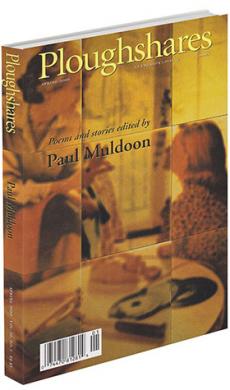rev. of Equal Love by Peter Ho Davies
Equal Love
Stories by Peter Ho Davies. Mariner Books/Houghton Mifflin, $12.00 paper. Reviewed by Michael Byers.
In Peter Ho Davies’s second collection,
Equal Love, common domestic situations give rise, in unexpected ways, to moments of luminous reflection. Davies’s stories are allusive, mysterious, often funny, and tender. As in his debut collection,
The Ugliest House in the World, Davies continues to be a meticulous, imaginative craftsman whose work is polished at every level. In “Brave Girl,” we see a dentist’s office, and its back room, “a tiny cubicle intended for gas extractions but rarely used by my father . . . There was still a high bed, upholstered in blistered red vinyl, and a tall stainless steel instrument tray which I could use as a desk.” And in the shop of Mr. Pang, who builds grave goods for Chinese funerals, we see “white paper furniture, and further back life-size paper suits hanging on the wall.”
The strongest stories in the book, “Small World” and “Equal Love,” are about love, and lust, between people who shouldn’t be falling in love or having sex. Risk and infidelity are always reliable materials, but Davies views them with his own humane eye, presenting good, mostly likeable people, aware of their frailties, who are nonetheless apt to do nasty things. When the married Wilson, in “Small World,” goes to Boston for an actuarial conference and discovers that his high school sweetheart, Joyce, still lives in the city, he arranges to meet her. Wilson’s wife back home is in her third trimester of pregnancy. He knows he shouldn’t go see this old flame, but he does. “Something about the odds of it, he decides, the odds of his being here, of her still being in town, of its really being her, makes it feel implacably innocent — not like a choice, more like an accident of fate.” How plausible this sounds! Later that night, when Wilson and Joyce end up parked by a frozen pond, the comical awkwardness of the
car “makes it seem less serious, not like faithlessness, not like betrayal, not like sex, at least not until it’s over and the car windows are fogged and they pull their clothes on again. Or perhaps having started, neither of them has the heart to stop.” The story is — like much of
Equal Love — sad, lovely, and a little frightening.
In many of these stories we get only a gesture toward resolution. Davies, for the most part, allows his situations to speak for themselves. In “Today Is Sunday,” for example, a son and his middle-aged father drive off to the nursing home to visit the father’s extremely senile mother. In a moment of confusion, the grandmother addresses the son as the father, sounding a chord of unease in the younger man. But the story ends with the father and son discussing their smoking habits on the drive home. It’s a tender, meaningful exchange, but it’s lightly handled, and what could have been a weighty moment turns out not to be. The story, as a result, feels pleasantly unbuilt — nicely incidental, and memorable not for any ostentatious architecture but for its acuity of observation and its smooth, confident movement. In two other stories, where the resolutions are less glancing (“Cakes of Baby” and “Frogmen”), the stories end as though with a sudden sharp noise-surprising, but fitting in both instances.
It is, finally, Davies’s range that is most impressive. The chorus of voices in
Equal Love is more diverse than in any collection in recent memory: we read stories from the point of view of a middle-aged black postman in 1960’s New Hampshire, a ten-year-old English boy, a Chinese-American publishing scion in San Francisco, a laid-off English encyclopedia salesman, and a drug-addled new mother in Oregon. Every one of these voices rings entirely true, testament to Davies’s perfect ear. Peter Ho Davies’s own voice-gentle, lucid, assured-is an indispensable one.
Michael Byers is the author of the story collection The Coast of Good Intentions.
His most recent story in Ploughshares,
“The Beautiful Days,” has been selected for an O. Henry Award.

